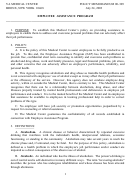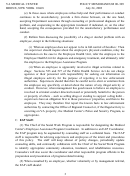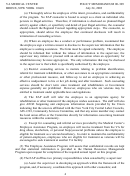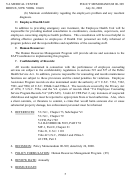Equal Employment Opportunity (Eeo) Policy And Program Administration Form Sample Page 50
ADVERTISEMENT
VA MEDICAL CENTER
POLICY MEMORANDUM 00-309
BRONX, NEW YORK 10468
July 24, 2003
C. Drug Abuse. A health problem characterized by the use of a drug in a manner or to a
degree that interferes with the individual's health, interpersonal relations, economic
functioning or standing in the community. For the purpose of this policy, drug abuse is
defined as a health problem in which the employee's job performance and/or conduct are
impaired as a direct consequence of the use of drugs.
D. Biopsychosocial. A term encompassing an individual's physical, mental, and social
status. For the purpose of this policy, biopsychosocial may include physical, emotional,
financial, marital, family, legal, or vocational problems that are adversely affecting the
employee's job performance and/or conduct.
4. RESPONSIBILITIES AND PROCEDURES:
A. Employees:
Employees who suspect they may have a problem with alcoholism or drug abuse, even in
the early stages, or who may have any other problem that is interfering with their personal or
work life and that may be treatable by a mental health professional, are encouraged to
voluntarily seek counseling and information. To obtain confidential assistance, the employee
should call the office of the Employee Assistance Program (EAP) at extension 6942. It is the
employee’s responsibility to follow through with the referral from EAP, and it is the
employee’s responsibility to make the necessary financial arrangements for this treatment.
B. Supervisors:
(1) Supervisors are responsible for recognizing when employees become deficient in
job performance and/or conduct.
Supervisors have the additional responsibility for
bringing such matters to the attention of employees and for providing them with
opportunities to correct their problems, regardless of their origin.
Generally, early
intervention will be most helpful in returning employees to productivity, and it may even
be a life-saving measure. Therefore, supervisors should:
(a) Be observant of work and/or behavior changes of assigned employees and
ultimately refer the employee for counseling if the case appears to involve the abuse
of alcohol or drugs, or other personal problems that may be impacting negatively on
performance, attendance, or other job-related factors.
(b) Document specific instances of unacceptable work performance, behavior, or
attendance.
(c) Advise medical and/or EAP staff of the employee's problem by describing the
behavior objectively and without attempting to diagnose or draw conclusions, which
is a medical and/or counseling responsibility.
(d) Interview the employee by focusing on the poor work performance and/or
conduct and providing information about the Employee Assistance Program services
if such performance or conduct problems appear to be caused by a personal or health
problem.
2
ADVERTISEMENT
0 votes
Related Articles
Related forms
Related Categories
Parent category: Legal
 1
1 2
2 3
3 4
4 5
5 6
6 7
7 8
8 9
9 10
10 11
11 12
12 13
13 14
14 15
15 16
16 17
17 18
18 19
19 20
20 21
21 22
22 23
23 24
24 25
25 26
26 27
27 28
28 29
29 30
30 31
31 32
32 33
33 34
34 35
35 36
36 37
37 38
38 39
39 40
40 41
41 42
42 43
43 44
44 45
45 46
46 47
47 48
48 49
49 50
50 51
51 52
52 53
53 54
54








